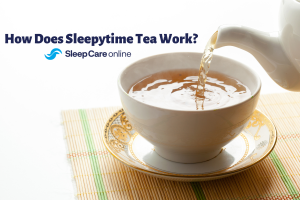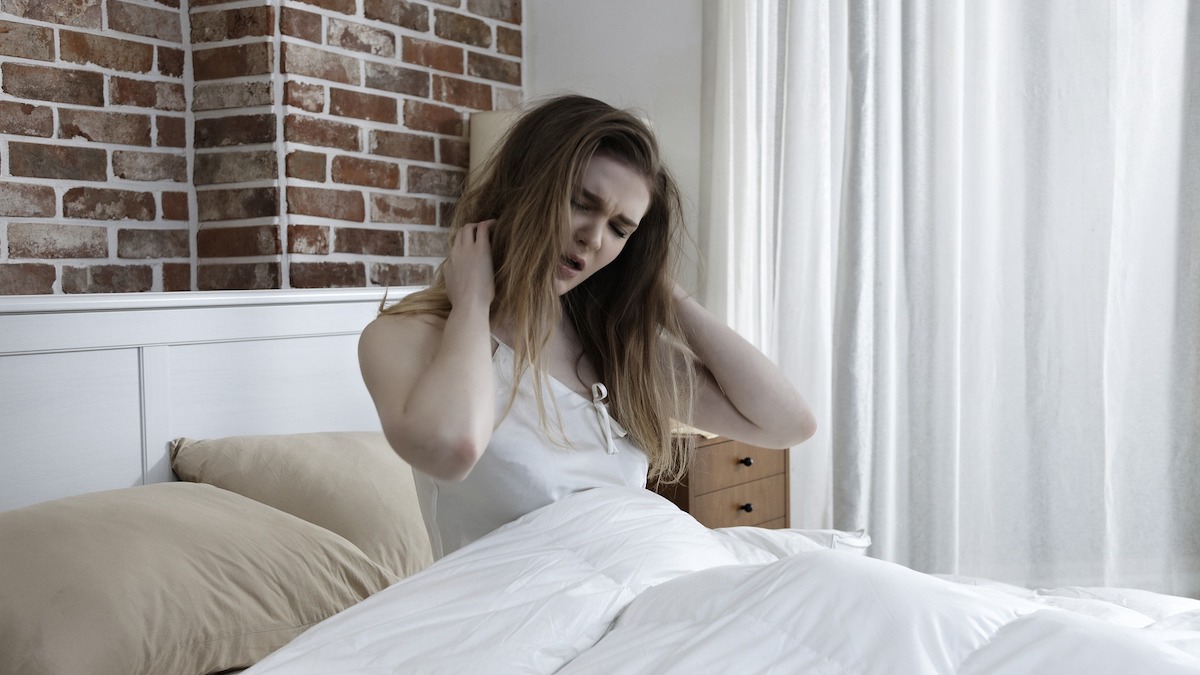Medical Disclaimer: This article is for informational purposes only and should not replace professional medical advice. Consult your healthcare provider before using herbal teas as sleep aids, especially if you’re pregnant, nursing, or taking medications.
Key Takeways
- Sleepytime tea can be a beneficial part of a healthy bedtime routine for general relaxation and mild sleep issues.
- The effectiveness of herbal teas varies significantly between individuals, and they are not a cure for chronic or severe sleep disorders.
- Herbal tea is not a treatment for sleep apnea. If you suspect you have a sleep disorder, consult a medical professional for a proper diagnosis and treatment.
Sleepytime tea is a popular herbal remedy that promotes relaxation and prepares the body for rest, making it one of the best teas before bed for a calming bedtime routine. Unlike regular tea or coffee, these caffeine-free blends are specifically formulated to help you wind down by targeting the stress hormones and neurotransmitters that affect your sleep wake cycle.
But does sleepytime tea work? And what are the key sleepytime tea benefits? Let’s explore how does sleepy time tea work and discover if this natural sleep aid lives up to its reputation.
How Sleepytime Tea Works?
Sleepytime tea is unique among teas as it contains calming ingredients such as chamomile. These ingredients can calm the nervous system and modify the neurotransmitters involved in sleep.
The flowering herb has been used for centuries to facilitate sleep. It has also been used to relieve insomnia, promote overall well-being, and encourage healthy sleep. There have been several studies on chamomile teas and if they really work. Some studies have shown that the herb may help with anxiety, but this has not been confirmed. Other ingredients commonly found in sleepy teas include valerian root, passionflower, lemon balm, spearmint, and lemongrass.
By combining calming herbs like chamomile, valerian root, and passionflower, sleepytime tea is often considered the best tea before bed for those looking to naturally support relaxation and sleep.
The Science Behind Sleep-Promoting Herbs
Understanding how sleepytime tea works involves examining the active compounds in various herbs. Most sleep-inducing herbs function in one of the following ways:
- GABA Enhancement: Increasing the activity of gamma-aminobutyric acid (GABA), a neurotransmitter that promotes relaxation and has a calming effect on the nervous system.
- Stress Hormone Reduction: Lowering levels of cortisol and adrenaline, which are hormones that keep you alert and can interfere with sleep.
- Neurotransmitter Modulation: Affecting key pathways involving serotonin and dopamine that help regulate your body’s sleep-wake cycle.
Does Sleepytime Tea Work?
Although more studies need to be done into the effectiveness of chamomile, there has been a recent short-term trial that studied 40 healthy adults who drank sleep daily on a daily basis. The tea these people drank had ingredients consisting of valerian root and passionflower. This study was conducted for one and monitored sleep quality compared to those who did not drink sleepytime tea. Science does back up these ingredients, but it also could be mental that tea could help people fall asleep.
The routine of drinking sleepytime tea before bedtime is a helpful part of good sleep hygiene. While stimulant beverages such as regular tea or coffee do not help sleep, sleepytime tea is ideal for those looking for a calming, warm beverage before going to bed. According to the Sleep Foundation, building a consistent bedtime routine that includes relaxing activities in the 30 to 60 minutes before bed can provide a foundation for sufficient rest.
Key Ingredients & Their Benefits
Herbal sleepytime teas are made from a variety of ingredients, each with unique properties to help you relax.
Chamomile Tea
Chamomile Tea This flowering herb has been used for centuries to facilitate sleep and relieve insomnia. It contains the antioxidant apigenin, which binds to certain brain receptors to promote sleepiness.
- Benefits: Contains mild sedative properties, may reduce anxiety, and has anti-inflammatory effects.
Valerian Tea
Valerian Tea Traditionally used as a natural remedy for insomnia and anxiety, valerian root can help people fall asleep faster and improve sleep quality.
- Benefits: Increases GABA levels in the brain, may reduce the time it takes to fall asleep, and has been a sleep aid for centuries.
Passionflower Tea
Passionflower Tea While not as well-known as chamomile or valerian, passionflower has a notable calming effect that can help reduce insomnia and anxiety.
- Benefits: Naturally boosts GABA production, may reduce restlessness, and has gentle sedative effects.
Lavender Tea
Lavender Tea More than just an aromatic scent, drinking lavender tea can help you have a more restful sleep by reducing the stress hormone cortisol.
- Benefits: Reduces cortisol levels, offers aromatherapy benefits through scent, and supports your body’s natural relaxation response.
Low-Caffeine Green Tea
Low-Caffeine Green Tea For those who want a light tea, low-caffeine green tea contains the sleep-promoting compound L-theanine.
- Benefits: Contains L-theanine for relaxation, promotes alpha brain wave activity, and reduces stress-related hormones.
Pros and Cons of Drinking Teas to Help You Sleep
Pros:
- Natural and gentle: Non-habit forming compared to sleep medications
- Multiple benefits: Often provides additional health benefits beyond sleep
- Ritual value: Creates a calming bedtime routine
- Widely available: Easy to find and relatively inexpensive
- Customizable: Can blend different herbs for personalized effects
- Minimal side effects: Generally safe for most people
- Aromatherapy benefits: Pleasant scents enhance relaxation
The documented sleepytime tea benefits make it an attractive option for those seeking natural sleep support without the potential side effects of pharmaceutical sleep aids.
Cons:
- Variable effectiveness: Results differ significantly between individuals
- Limited research: More studies needed for definitive proof
- Potential allergies: Some people may be allergic to certain herbs
- Pregnancy concerns: Many herbs not recommended during pregnancy
- Drug interactions: May interact with certain medications
- Mild effects: May not be strong enough for severe sleep disorders
Bathroom disruption: Drinking fluids before bed may cause nighttime awakenings
Best Practices for Drinking Sleepytime Tea
- Timing: Drink 30–45 minutes before bed, ideally finishing at least two hours before sleep to avoid nighttime bathroom trips.
- Preparation: Steep for 5–7 minutes in hot water (195–205°F); one 8 oz cup is usually enough.
- Effectiveness: Pair with a consistent bedtime routine—dim the lights, avoid screens, and use the ritual to signal your body it’s time to rest.
- Tip: If you exercise in the evening, a cup after cardio can help you wind down. Keeping a sleep diary may also help you identify which blends work best.
Risks and Side Effects of Sleepytime Tea
Sleepytime tea is generally safe, but some ingredients may cause side effects:
Common Side Effects by Ingredient:
- Chamomile: Allergic reactions in people sensitive to ragweed, chrysanthemums, or daisies
- Valerian: Headaches, dizziness, stomach upset, or morning drowsiness
- Passionflower: Dizziness, confusion, or irregular muscle action
- Lavender: Skin irritation or hormonal effects with excessive use
Important Warnings:
- Start with small amounts to test tolerance
- Avoid if you have known allergies to specific herbs
- Consult healthcare providers if taking medications
- Discontinue use if adverse reactions occur
- Be cautious when driving or operating machinery after consumption
Sleep Apnea and Herbal Tea
While a warm cup of herbal tea can be a comforting part of a bedtime routine, it is not a treatment for sleep apnea.
- Herbal Tea: Provides relaxation and may help you fall back asleep after an awakening.
- Sleep Apnea: Is a serious medical condition where your airway collapses during sleep, causing repeated breathing interruptions.
- The Bottom Line: Herbal tea cannot address the underlying physical causes of sleep apnea, such as airway obstruction. Effective solutions may include medical devices, lifestyle changes, or supportive aids such as a sleep apnea pillow to improve sleep posture.
For milder cases, lifestyle strategies like exercises for sleep apnea can also help strengthen airway muscles and reduce symptoms—but professional diagnosis is still essential.
If you struggle with symptoms like loud snoring, gasping for air, or excessive daytime sleepiness, tea is not the solution. You need a proper diagnosis and medical treatment.
Does Sleepytime Tea Benefit Sleep Apnea?
Although drinking a hot cup of herbal tea could aid in falling asleep at night, it is not a treatment for sleep apnea. Some feelings like tiredness and anxiety can be reversed by using all types of herbal and non-herbal medicine, but it is not a long-term fix for conditions like sleep apnea. Airways narrow and collapse during apneas causing people to wake up gasping for air, so sleepytime tea could help put patients back to sleep. However, it will not prevent any future apneas during a night’s sleep.
When Is the Ideal Time to Drink Sleepytime Tea?
Like most liquids before bedtime, you should stop about two hours before you go to bed. The same goes for sleepytime tea. However, enjoy your tea well ahead of bedtime. That’s so your sleep is not interrupted in the middle of the night by going to the bathroom.
Also, if you exercise in the evenings, a cup of sleepytime tea after a cardio workout can help you wind down for bedtime. Keep in mind that to get the most out of your tea, steep time is critical. The longer you allow your tea to steep, the stronger it gets.
Are There Any Alternatives to Drinking Sleepytime Tea?
There are alternatives to sleepytime tea including some beverages that promote sleep if you do not want a hot beverage or simply do not like drinking tea. Almond milk, cow’s milk, and cherry juice have been shown some evidence to help with sleep. Along with a host of other herbal teas to choose from, you can also take herbal supplements. These teas are made including valerian, chamomile, lemon balm, and passionflower supplements as capsules.
Diagnosing & Treating Sleep Apnea
If you suspect you have sleep apnea, getting a proper diagnosis is the first step toward effective treatment.
Sleep Care Online offers a Complete Care package to make the process easy:
- Telehealth Visit: Schedule a 10-minute telehealth visit with a healthcare provider to discuss your symptoms.
- Home Sleep Test: A multi-night, disposable home sleep apnea test is mailed directly to you.
- Results & Treatment: A physician analyzes your data and provides a prescription if needed, such as for a CPAP machine.
You’ll then be connected with sleep experts who can help you select equipment and start therapy.
Frequently Asked Questions
Yes, for most people, sleepytime tea can be a beneficial and healthy part of a bedtime routine. The herbal ingredients provide natural relaxation support.






